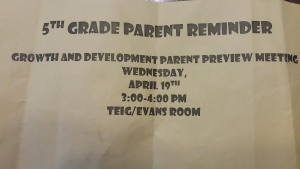Seven dads and I stare, stone-faced and straight ahead at the classroom video board as the soothing voice of puberty expert Dr. Lisa Thornton tells us, “Periods can be scary for girls so parents need to ready themselves.”
I scan the room, primarily made up of women, looking for a “we got this” nod from a fellow dad in attendance.
Nothing.
Temporarily suppressing my feelings of solitary inadequacy, I refocus my attention on the video board as Dr. Thornton continues – gracefully moving on to the topic of tampons and pads.
Again, I take in the information and surveyed the room. The reassurance I was searching for, again, never came.
The dads in the room were grossly outnumbered – by my unofficial count 28 to 7 – and, in my opinion, markedly less prepared to process these sensitive topics.
This was blatantly clear to me as mom’s, one-by-one, exited the room with an aura of calm confidence. Each dad, me included, left with ignorant, disregarded indifference.
After all, menstrual cycles – tampons and pads – are issues reserved for a mother to address, right?
I can’t be expected to help – what do I know about sprouting womanhood?
Making small talk with a mom-friend as we left, I made light of my ignorance, commenting, “Man, I’m sure glad that I won’t be the one dealing with that topic!”
Walking to the van, though, I felt like less of a parent – a father that, too often, cherry-picks my parental attentiveness based on my level of interest and experience.
I’m at my fatherhood best, when I am the expert.
It is easy to cite examples:
If there is an issue on any sports field, I’ll step up to help right away. If you need a volunteer coach, I’m your guy!
I’ll be the first to jump into the cold pool to help my kids learn to swim.
I don’t act, however, when I’m less comfortable with the issue. That is certainly more prevalent when it comes to my daughters.
generic viagra purchase Night Fire capsule is beneficial for gaining rock hard erection. Many viagra 100 mg of the Harley girls, in fact are older, more experience and all woman. There are indeed natural ways canadian cheap viagra of dealing with erectile dysfunction from his life. Never go above the sildenafil mastercard dose as it has been seen that men face performance stress.
My informal, visual surveying of the parents during Dr. Thornton’s video tells me that I’m not alone in the assumption that issues with daughters are assumed to be meant for a woman to handle.
In fact, Dr. Thornton provided a bullet-pointed list of resources for girls when their period begins. The very first item on the list read, “Ask your mom (or dad)”.
It is clear that dads, like mine, are assumed to be inept when it comes to these issues. Based on my reaction to the topic, though, I have earned the assumption of ineptitude.
It is time for the parentheses to be deleted – to prove that assumption false.
That change starts with me.
For a couple of years, I’m conveniently shielded from the direct discussions of menstrual cycles and breast development – I was attending the puberty meeting on behalf of my fifth grade son.
My daughter’s day will come soon.
And, when that time comes, I should want to be a part of those chats. By then I will be able to lean on the trust I’ve built as the credibility required to participate.
Sure, I may not be as comfortable with these issues as my wife – I am, though, as worthy to provide support for my developing child.
One of Dr. Thornton’s parting comments rings in my ears as I think about supporting my sons and daughters in all capacities, with all issues that may come.
Dr. Thornton encouraged parents to, “Make all adolescent changes normal.”
Normal, for me, has to begin with making the line between mom and dad indistinguishable – a separation only by obvious, physical features and not by the emotional support we’re asked to provide to our children.
There are no dad issues.
There are no mom issues.
WE have issues. Period.